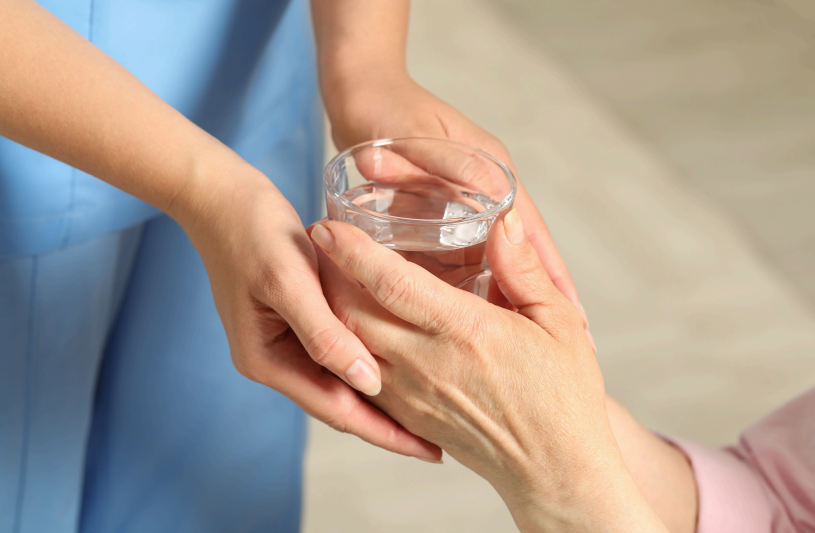Urinary Tract Infections (UTIs) are the most common infection in elderly adults. Left untreated, UTIs, an infection in any part of the urinary system, including the kidneys, ureters, bladder, and urethra, can lead to serious health issues. Repercussions of UTIs, particularly in older adults, can include kidney infection and damage, sepsis, and changes in behavior or confusion.
Knowing the early signs to look for and understanding the causes and steps to prevent UTIs is essential for older adults and caregivers. Recognizing the early warning signs and seeking prompt treatment can be vital to protecting yourself or your loved one from progressing symptoms and potentially severe health impacts.
Common Causes of Urinary Tract Infections
While UTIs are common among both males and females, women experience UTIs at a higher rate, up to 30 times more frequently than men, according to the Office on Women’s Health. Older adults are more likely to develop urinary tract infections (UTIs) than younger people due to several risk factors, including:
- Weaker urine flow: This can lead to incomplete bladder emptying, which can cause bacteria to build up in the bladder.
- Enlarged prostate: In men, an enlarged prostate can make it difficult to empty the bladder.
- Weakened immune system: Older adults have a less robust immune system than younger people.
- Incontinence: Reduced bladder and bowel control can increase the chance of bacteria entering the urinary tract.
- Other risk factors for UTIs include: malnutrition, which can weaken the immune system; diabetes, which can increase the risk of UTIs due to high blood sugar levels providing a favorable environment for bacteria; constipation, which can lead to incomplete bladder emptying; and long-term hospitalizations, which can increase exposure to bacteria and disrupt normal bladder function.
- Catheter use: Older adults are more likely to use catheters, which can increase the risk of UTIs.
Antibiotics are the standard treatment for UTIs. Finishing the entire prescription is crucial, even if you start feeling better before the medication is gone. Stopping the antibiotics early can lead to a recurrence of the infection, and the bacteria may become resistant to the antibiotic, making future infections harder to treat.
New Study Shows Increase in E. Coli-Related UTIs
A study by the George Washington University Milken Institute of Public Health shows that some of the more dangerous strains of E. coli bacteria found in meat could be responsible for more UTIs than previously known, accounting for over half a million annually in the United States.
The study estimates that strains from raw meats commonly found in grocery stores could cause as many as 8% of E. coli-related UTI cases in the U.S. annually (between 480,000 and 640,000).
The study notes some causes of the increased risk and rate of E. coli-related UTIs, including antibiotics given to animals in the food industry and overuse, leading to resistance in animal breeds. Resistant bacteria in the meat can then be passed along to humans through unhygienic handling. Precautions that should be regularly implemented to avoid the risk of E. coli bacteria transmission include regular and thorough hand washing with warm/hot water and soap when preparing or handling raw meat and always using a separate surface for cooking raw foods.
Detect Early; Know the Symptoms
Data shows that UTIs result in more than 8 million doctor visits yearly in the U.S. Awareness of UTIs and knowing what symptoms to look out for are great ways to protect your or your loved one’s overall health.
Symptoms of UTIs can vary from person to person, particularly in men and older adults. Some individuals are at a higher risk for UTIs, particularly those with limited mobility, a weakened immune system, or urinary tract obstructions from conditions like an enlarged prostate or kidney stones. Early detection and treatment of UTIs is important and can help to avoid more severe health impacts.
Common Symptoms to Watch for Include:
- Cloudy, bloody, or strong-smelling urine
- A frequent or urgent need to use the bathroom
- Pain or burning with urination
- Low-grade fever
- Night sweats
- Cramping or pressure in the lower abdomen
While the above are common warning signs, an older person may exhibit different symptoms due to their aging immune system. Monitoring closely for any sudden changes in behavior, such as decreased energy, appetite, strength, balance, and mobility, is vital.
Other UTI Signs to Be Alert to Include:
- Agitation
- Confusion
- Hallucinations
- Extreme fatigue
- Impaired motor skills
- Dizziness
- Falls
- Sudden urinary incontinence
If you notice any of these signs or symptoms in your loved one, contact their doctor immediately!
Be Proactive – Reduce the Risk
Caregivers are crucial in identifying the early signs and preventing urinary tract infections (UTIs) in elderly patients. Here are some steps you can take to reduce the risk:
- Encourage proper hydration: Ensure the patient drinks adequate water throughout the day to help flush out bacteria from the urinary tract.
- Promote good hygiene: Assist the patient with regular and changing incontinence products and bathing, especially around the genital area, and encourage proper wiping techniques after using the bathroom to prevent the spread of bacteria.
- Dress patients in loose, breathable clothing: Avoid tight-fitting clothing that can trap moisture and promote bacterial growth.
- Monitor and assist with toileting: Encourage the patient to empty their bladder regularly and help them with toileting as needed to prevent urinary retention.
- Promptly address any signs of discomfort or pain during urination
- Ensure proper catheter care: If the patient has a urinary catheter, follow proper catheter care guidelines to reduce the risk of infection.
- Encourage regular bathroom breaks: Prompting the patient to use the bathroom regularly, as holding urine for extended periods can increase the risk of UTIs, is a proactive step that can help to prevent UTIs.
- Provide a balanced diet: Offer a diet rich in fruits, vegetables, and whole grains to support overall health and immune function, which can help prevent UTIs.
- Cranberry juice (not cranberry juice cocktail)/ Vitamin C: Some studies suggest that cranberry juice and vitamin C may reduce the risk of UTIs by preventing bacteria from sticking to the urinary tract walls.
- Review medications: Some medications can increase the risk of UTIs. Work with healthcare providers to review medications and explore alternatives if necessary.
- Closely monitor for changes in behavior or confusion: these may be early signs of a UTI.
- Consult with healthcare providers to develop a care plan tailored to the individual’s needs and risk factors for UTIs
- Always practice safe meat handling and proper hygiene when preparing and cooking meats, including:
- Rinse raw meat before handling
- Practice regular hand washing
- Utilize separate surfaces for raw meat
- Thoroughly wash surfaces used for meat handling and preparation
Perfect Care Match offers expert and affordable home care services to meet your needs. We specialize in Alzheimer’s and other forms of dementia and are dedicated to being a resource for caregivers, holistic wellness, and coaching. Contact us today at info@PerfectCareMatch.com or call 1-833-PCMATCH to learn more about our flexible caregiving options and programs.
References:
George Washington Milken School of Public Health. (2023, May). Bacteria from Meat Likely to Cause More than Half a Million Urinary Tract Infections in the U.S. Every Year. Health, M. S. (n.d.). Accessed Sept., 26, 2024
Rowe TA, Juthani-Mehta M. Urinary tract infection in older adults. Aging health. 2013 Oct;9(5):10.2217/ahe.13.38. doi: 10.2217/ahe.13.38. PMID: 24391677; PMCID: PMC3878051.
Dutta C, Pasha K, Paul S, Abbas MS, Nassar ST, Tasha T, Desai A, Bajgain A, Ali A, Mohammed L. Urinary Tract Infection Induced Delirium in Elderly Patients: A Systematic Review. Cureus. 2022 Dec 8;14(12):e32321. doi: 10.7759/cureus.32321. PMID: 36632270; PMCID: PMC9827929.
Do Cranberries Help Treat UTIs? – Doctor On Demand. https://doctorondemand.com/blog/health/do-cranberries-help-treat-utis/

